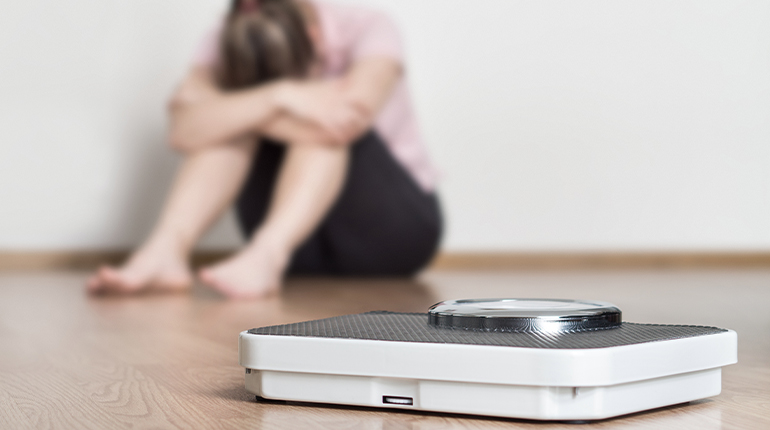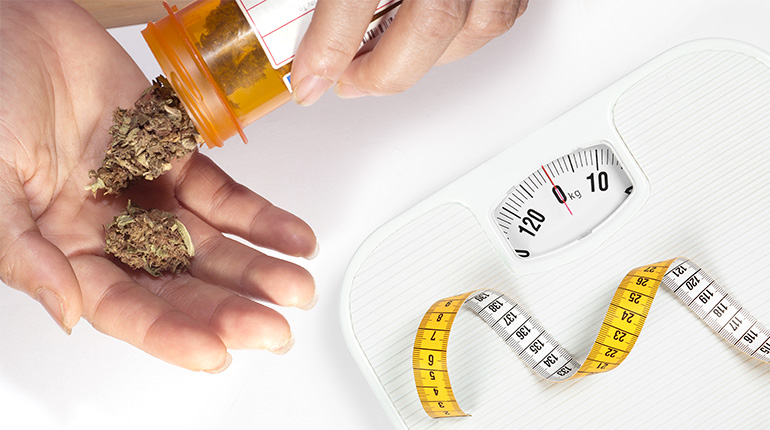Does Quitting Weed Make You Gain Weight?

Some marijuana users may wish to quit using the substance. Reasons for this decision include potential skin, respiratory, and cardiovascular improvements.
Certainly, those who smoke the substance will likely experience issues such as coughing, wheezing, and shortness of breath. Just because smoking marijuana is less unhealthy than smoking tobacco cigarettes doesn’t mean it isn’t causing damage to your body. After all, you’re inhaling combusted plant matter!
Weight management is another reason for quitting marijuana. Yet, some people end up gaining weight after quitting weed. The idea that using the substance results in the “munchies,” thus spiking weight gain, is far too simplistic. The relationship between cannabis and weight is a multifaceted issue encompassing several factors.
This article investigates the science and evidence surrounding the possibility of gaining weight when quitting marijuana.
What is the Relationship Between Weed and Weight Gain?
One of the most famous aspects of using marijuana involves having a bout of the munchies. This term describes the phenomenon of desiring food and getting a greater degree of pleasure from eating after consuming weed. This boils down to the effects of delta-9 THC on the brain.
THC binds to cannabinoid receptors in the brain, particularly the CB1 receptors, which majorly regulate appetite. Once you have the munchies, you’ll likely eat high-calorie foods, thus promoting weight gain.

However, it’s not true that ALL marijuana users experience the munchies. It depends on personal sensitivity, the THC content, and the type of strain. Some people are prone to experiencing the munchies no matter what type of weed they use. However, high-THC strains are more likely to spike your appetite. Also, terpenes such as limonene and myrcene may amplify the munchies effect.
There is even a suggestion that indica strains are more likely to stimulate the brain into thinking you’re hungry. By contrast, sativa strains may have the opposite effect because they tend to have a high concentration of THCV, a cannabinoid linked with suppressing appetite.
Research Suggests Marijuana Users Gain Less Weight
Scientific research into the relationship between cannabis and weight is ongoing, and more is required. A study published in 2011 surveyed over 50,000 people in two separate surveys.
In survey #1, just 14% of regular marijuana smokers were obese, compared to 22% of non-users. In survey #2, 17% of regular weed users were obese, compared to 25% of non-users.
A study published three years later found something unusual. The researchers discovered that people who regularly used large amounts of weed consumed more calories than people who used less marijuana or none at all. Oddly, the regular weed users still had a lower Body Mass Index (BMI) than the non-users.
Yet another study published in 2019 found that marijuana users gained less weight than non-users on average across a three-year period.
So, since marijuana users seem to gain less weight than non-users, one would expect to experience weight gain after quitting weed, right? This is not necessarily the case either.
How Does Quitting Smoking Affect Weight?
The notion that everyone who uses marijuana gets the munchies is incorrect. As is the idea that using the substance regularly leads to weight gain. If anything, it appears as if the opposite is the case.
With this in mind, it is easy to assume that weight gain will follow when you quit smoking weed. The truth is many factors are involved in determining whether quitting weed will lead to weight loss or gain.
What Are the Main Causes of Weight Gain/Loss When Quitting Marijuana Use?
Here are five of the main factors involved in changes to your weight once you quit marijuana. You could gain or lose weight once you stop using the substance.
1 – Metabolism
Your metabolism is one of the key factors in how quitting marijuana affects your weight. Metabolic rate relates to the speed at which your body burns calories when completing physiological functions like digesting food and breathing.

Your metabolic rate is likely different from the next person’s since it can vary due to gender, age, body composition, and genetics. The higher the metabolic rate, the faster one naturally burns calories.
Chronic marijuana users may have elevated metabolic rates. This explains why the 2014 study found that regular users consumed more calories than non-users while maintaining a lower BMI.
You free your body of THC’s influence when you quit using weed. As such, you may experience reduced appetite, decreased calorie intake, and temporary weight loss. Yet, your body will eventually adapt, and your metabolic rate and appetite will return to their “normal” levels.
Eating Habits
While your metabolic rate plays a role in dictating whether you gain or lose weight, your lifestyle choices are a much bigger factor. Simply put, you’ll gain weight if you eat more calories than you burn regularly. If you consume fewer calories than you burn, you enter a caloric deficit, and weight loss will follow.
If marijuana causes a spike in your appetite, quitting may lead to an overall calorie reduction. This is especially true if you had the munchies and went straight for high-calorie snacks.
Cannabis is also known for having mood-altering effects. Once you quit, you might find the need to cope with stress differently. There’s a chance you could engage in emotional eating, which will lead to weight gain. Conversely, quitting marijuana could result in you making better dietary choices now that you no longer crave calorie-dense foods.
Physical Activity
This is another area where research has found an unexpected outcome. If you believe in the stereotype that marijuana results in users being lazy, you’ll surely conclude that quitting weed leads to more energy and motivation. Consequently, the individual becomes more likely to exercise.
Yet, research has found that regular cannabis users tend to exercise more than non-users. Researchers from the University of Miami in Florida analyzed data from over 20,000 Americans from their teens to their twenties and thirties across 24 years.
They compared self-reported survey data on how often people used weed in the last month and how often they exercised in the previous week. Not only was there no statistical link between using weed more and exercising less, but cannabis users were more likely to work out!
Granted, marijuana smokers will have better lung function if they quit (assuming they’re not smoking something else). As such, they may find exercise easier and more enjoyable. Nonetheless, there’s no guarantee that quitting weed will lead to more exercise and a reduction in weight. Then again, exercise alone is an inefficient weight loss strategy anyway.
Stress Levels
It’s also fair to say that the effects of quitting marijuana on a person’s stress level are unpredictable. Some people feel an initial increase in stress after they stop using weed. This is especially the case amongst chronic users experiencing “withdrawal stress.” Symptoms include restlessness, insomnia, and irritability.
However, over time, you may have lower stress levels and better emotional regulation. In this scenario, you might develop better coping strategies for stress and not rely on food as a crutch.
Still, getting social support is very important. You may become more distanced from your circle of marijuana-using friends. You could feel isolated and stressed if you have little support outside of this group.
Nicotine
This is more of an issue for anyone who smokes marijuana and tobacco. For example, some people may roll blunts, a mixture of weed and tobacco. They may find that marijuana use is a trigger for nicotine. When they use weed, they experience increased nicotine cravings. So, when they quit using weed, their desire to consume nicotine disappears over time.

On the other hand, your nicotine cravings may increase after you stop consuming marijuana. After all, nicotine is incredibly addictive. Ultimately, quitting both substances simultaneously may prove overwhelming for some people. In this case, it is perhaps a good idea to try and quit one substance at a time.
Final Thoughts on Marijuana and Weight Gain
Whether you’re an MMJ cardholder in Arkansas or a recreational user in California, you might be concerned about gaining weight after quitting weed. The available research doesn’t support any assertions that regular marijuana users are heavier than non-users. In fact, it seems as if the opposite is the case.
Therefore, you might logically assume that once you quit marijuana, weight gain will follow. Yet, things aren’t that straightforward. Many factors dictate whether your weight will rise or fall after cannabis cessation.
Metabolic rate is unquestionably something to consider. Nonetheless, it is far from being the main issue. Your appetite may increase or decrease. You could find that your desire to exercise goes up or down. Your stress levels might elevate or fall, and you may become more or less focused on nicotine.
In the end, you have the power to decide whether your weight rises or falls if you decide to quit marijuana. Yes, you may have to overcome more obstacles than others, but the strength of your mind will determine the outcome.
